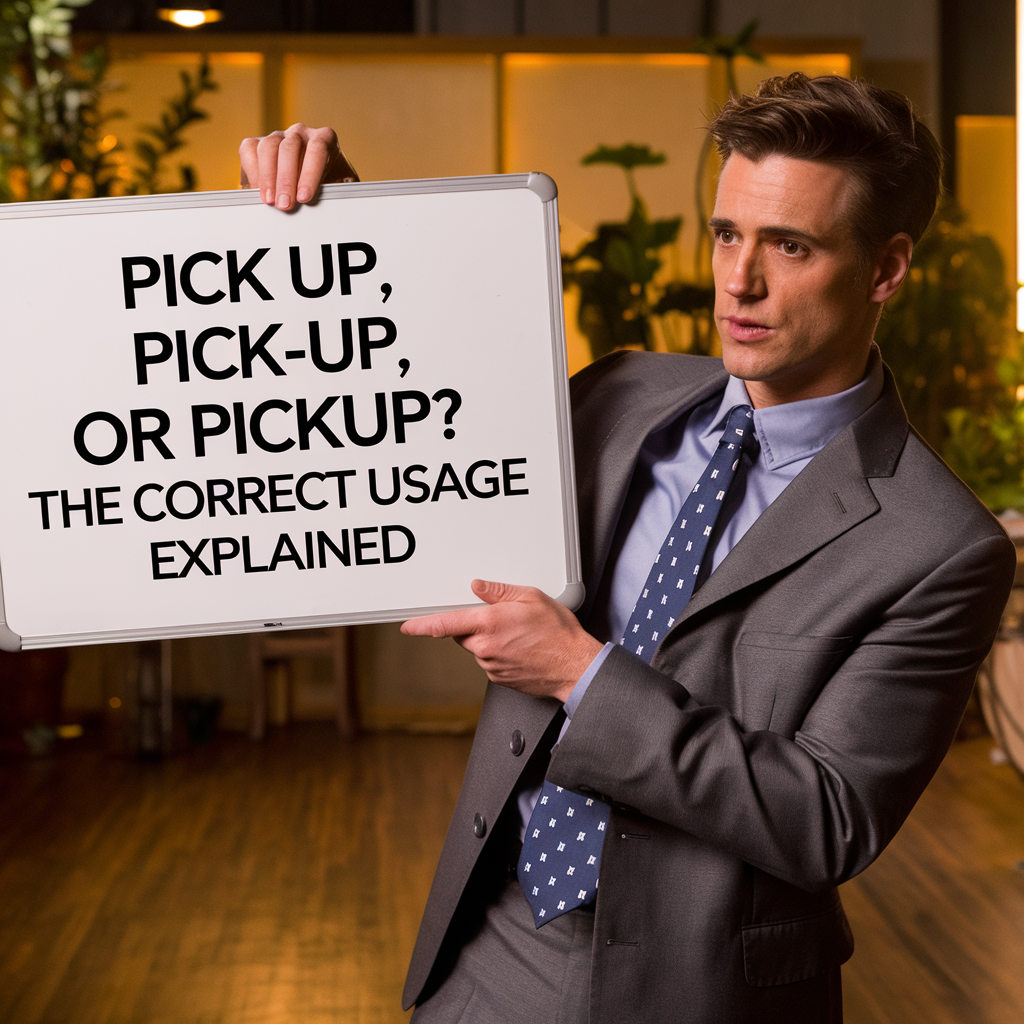Introduction
Have you ever hesitated while writing, unsure whether to use “pick up,” “pick-up,” or “pickup”? You’re not alone. The English language often causes confusion with words “pick up,” “pick-up,” or “pickup”that sound identical but have distinct meanings based on context.
Understanding the correct usage of these terms is crucial, whether you’re writing an email, a business report, or a casual text. Misusing them can change the meaning of a sentence entirely.
This guide will break down the differences and help you use them correctly in your writing.
Breaking Down the Differences
“Pick Up” – The Verb Phrase
“Pick up” functions as a verb phrase, meaning it describes an action. It consists of the verb “pick” and the preposition “up,” forming a phrasal verb with specific meanings.
Read More About This Article: Totalling or Totaling – Which Spelling to Use?
Common Uses of “Pick Up”
- Retrieving or collecting something – “I need to pick up my dry cleaning.”
- Learning or acquiring a skill – “She quickly picked up Spanish while living in Madrid.”
- Improving or increasing – “Sales are expected to pick up next quarter.”
- Lifting something – “Can you pick up that book for me?”
Grammar Tip:
Always use “pick up” when referring to an action. Since it’s a verb phrase, it must be accompanied by a subject and can take different tenses:
- Past: “She picked up the phone.”
- Present: “He picks up groceries every Sunday.”
- Future: “I will pick up my friend from the airport.”
“Pick-up” – The Hyphenated Form
“Pick-up” is used as an adjective or noun modifier. It typically describes something related to the action of picking up.
Common Uses of “Pick-up”
- As an adjective:
- “He plays in a pick-up basketball game every weekend.” (modifies “game”)
- “Please wait at the pick-up location.” (modifies “location”)
- As a noun modifier:
- “The hotel has a designated pick-up point.”
- “There’s a pick-up window for takeout orders.”
Grammar Tip:
Use “pick-up” when modifying another noun. If the sentence doesn’t work without it, you likely need a different form.
“Pickup” – The Noun
“Pickup” (one word) is a noun referring to an event, process, or thing.
Common Uses of “Pickup”
- Referring to a scheduled collection or retrieval:
- “The pickup for recycling is every Monday.”
- “She arranged a pickup for her online order.”
- Describing a vehicle:
- “He drives a pickup truck for work.”
- “The company offers pickup and delivery services.”
Grammar Tip:
Use “pickup” when referring to a thing or event, not an action. If you can replace it with “collection” or “retrieval,” “pickup” is the right choice.
Grammar and Writing Rules for Correct Usage
The Role of Context in Choosing the Right Form
Since all three forms sound identical when spoken, their function in a sentence determines the correct spelling.
Quick Test: How to Choose the Right Form
- Is it describing an action? → Use “pick up.”
- Is it modifying another noun? → Use “pick-up.”
- Is it a noun referring to a thing or event? → Use “pickup.”
Common Mistakes to Avoid
❌ Incorrect: “I will pickup my order.” (should be “pick up” as a verb)
✅ Correct: “I will pick up my order.”
❌ Incorrect: “The pickup truck is parked outside.” (Correct, but “pickup truck” should be clarified in context.)
✅ Correct: “The pickup truck is used for deliveries.”
Real-World Applications & Examples
Industry-Specific Usage
Different industries use these terms in specific ways. Here are some common examples:
| Industry | Example Sentence |
|---|---|
| Transportation & Logistics | “Your package is ready for pickup at the warehouse.” |
| Automotive | “He just bought a new pickup truck for his business.” |
| Retail | “Customers can schedule a pick-up time for orders.” |
| Sports & Recreation | “A group of friends organized a pick-up soccer game.” |
Formal vs. Informal Writing Considerations
In formal writing, using the correct form maintains clarity and professionalism. In casual conversation, people often misuse “pickup” instead of “pick up,” which can lead to grammatical errors in writing.
Quick Reference Guide for Writers
| Function | Correct Form | Example Sentence |
|---|---|---|
| Verb phrase | pick up | “I will pick up the groceries.” |
| Adjective | pick-up | “We have a designated pick-up zone.” |
| Noun | pickup | “The package is ready for pickup.” |
Conclusion
Mastering the difference between “pick up,” “pick-up,” and “pickup” is essential for clear and effective communication. By understanding their distinct roles, you can improve your writing and avoid common grammatical errors.
Final Tip: If you’re unsure, remember:
- If it’s an action, use “pick up.”
- If it modifies a noun, use “pick-up.”
- If it’s a noun itself, use “pickup.”
Want to test your understanding? Comment below with a sentence using each form correctly!
